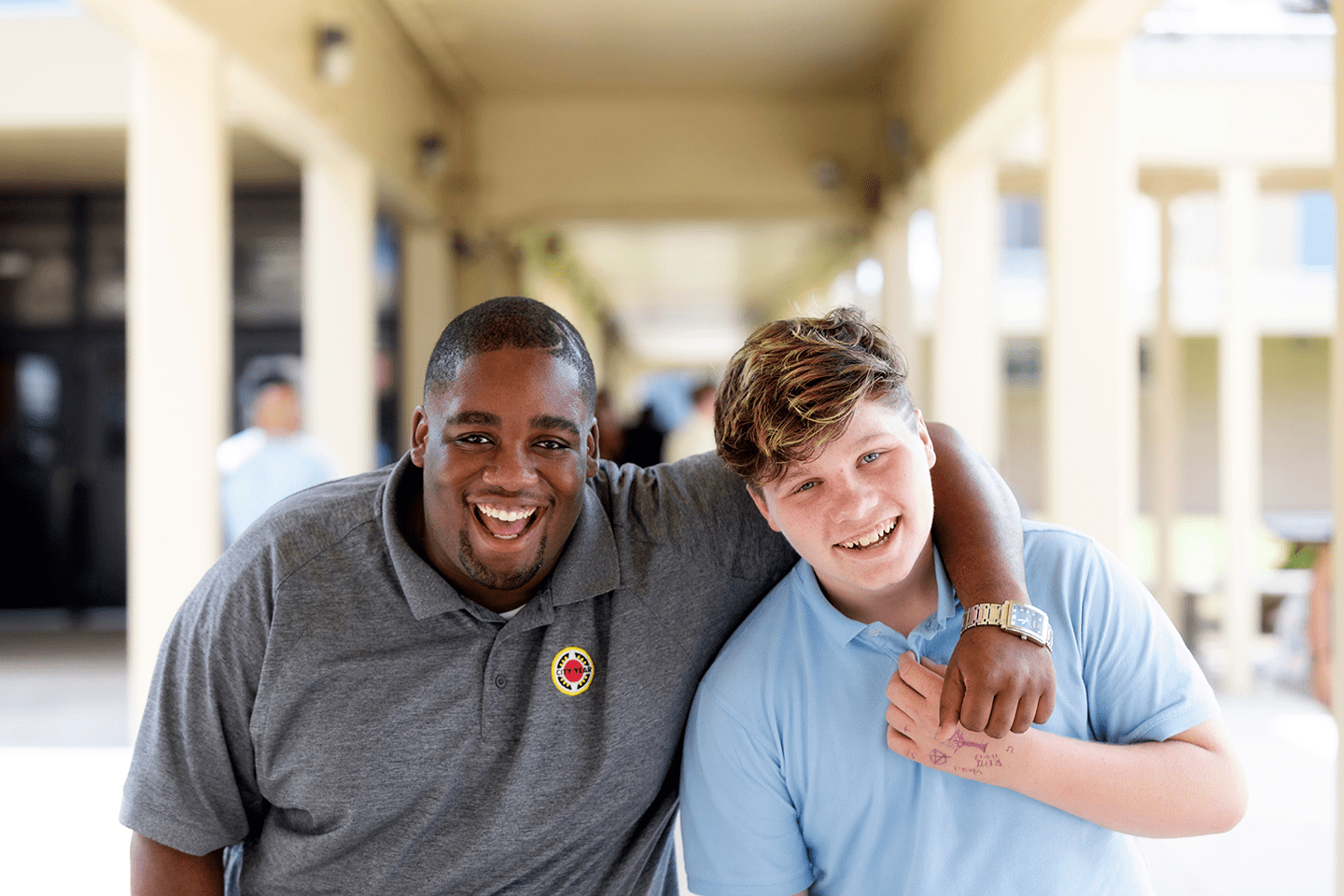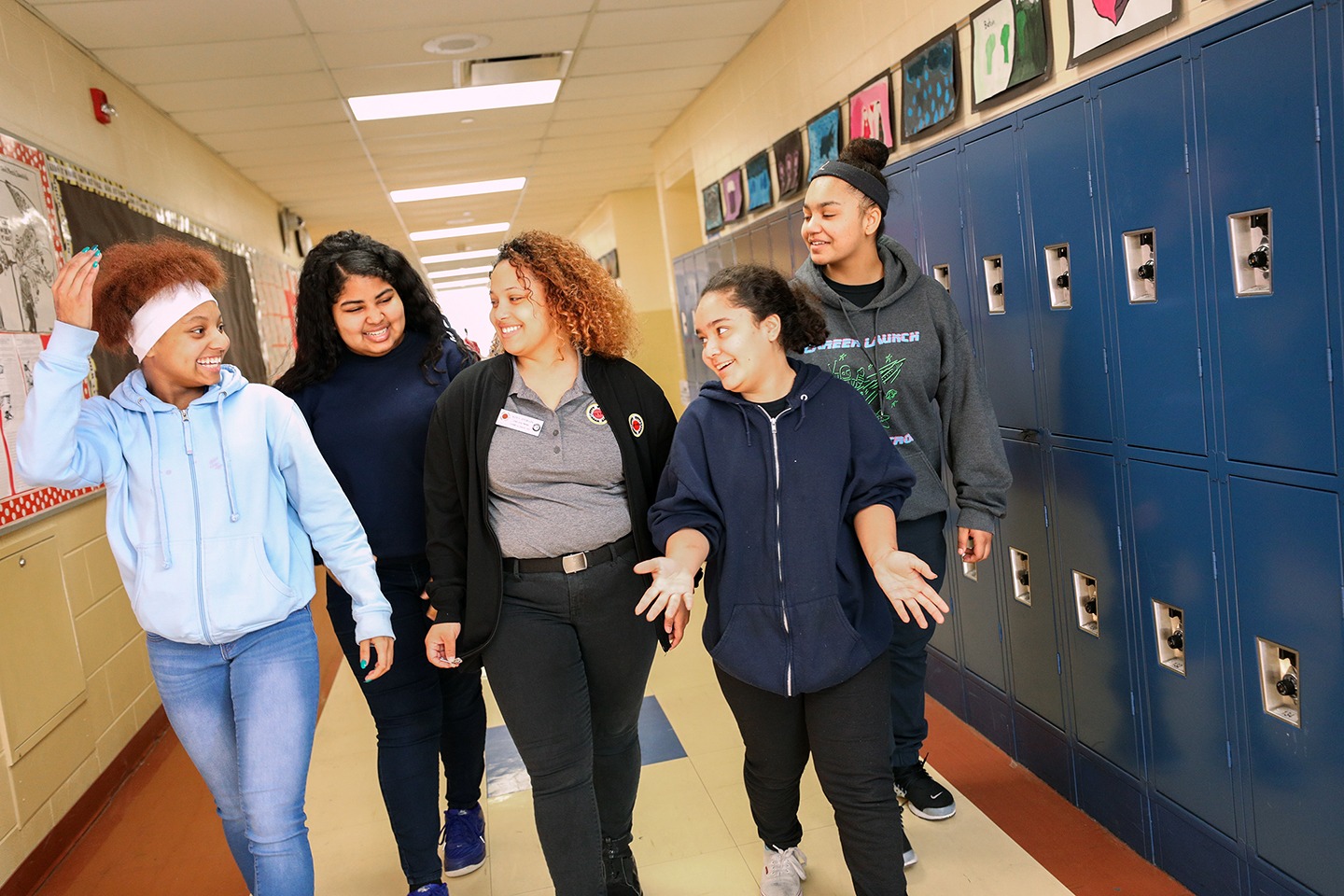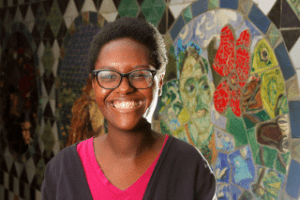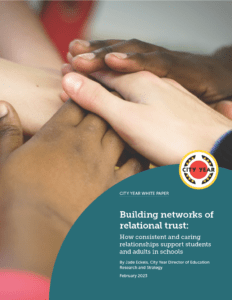Why building trust in schools matters

At City Year and at many other education- and youth-focused organizations, we talk a lot about the importance of caring adults building positive relationships with students. In fact, building relationships over time with young people is the cornerstone of all the work we do. Every day dedicated and trained AmeriCorps members partner with classroom teachers to provide students with caring, consistent, targeted support throughout the school day—support that is grounded in trusting relationships. Without this strong foundation, progress isn’t possible.
Relational trust has long been understood as an essential component of positive relationships in schools. When trust is present and thriving, students and teachers experience much more successful teaching and learning experiences.
New research on City Year’s holistic services by the Everyone Graduates Center at Johns Hopkins University affirms the importance of trust in the classroom and also highlights the powerful role of young adults serving as student success coaches, who help to generate trusting, caring and consistent relationships in the schoolhouse that benefit everyone in the school community.
In the words of an AmeriCorps member who was interviewed in the 2023 research study:
“When I think about an effective relationship, I really start thinking about trust. If a corps member has established trust with a student, and that trust translates into, whether that be academic supports, or whether that be social and emotional supports . . . I see that trust being the foundation from where they build on.”
These research findings are especially timely as we grapple with the impact of the pandemic on students and schools and learn more about the mental health issues young people are facing today. Ensuring that all students receive the academic, social and emotional supports they need to learn, develop and flourish has never been more urgent.
“Trust and academic success go hand in hand.”
The latest report by the Everyone Graduates Center at Johns Hopkins University, The Dynamics of City Year Interactions with Students . . ., explores the role of trust and relationships between AmeriCorps members, who are student success coaches, and the students they serve, and specifically how these trusting relationships help to support students’ social-emotional and academic growth. As one corps member told the research team: “trust and academic success go hand in hand.”
We invite you to read a corresponding white paper, Building Networks of Relational Trust, that describes how AmeriCorps members create and spread trust—with students, partner teachers and their own teammates. These networks of trust help to reimagine what schools can and should be—welcoming places that promote positive relationships, engaging learning environments and a sense of belonging for students and the adults who work with them.
The report found that:
“Several years of research on City Year’s holistic model indicates that by bringing additional capacity into systemically under-resourced schools, trained student success coaches can strengthen relationships, trust, and belonging, which helps teaching and learning to happen in optimal ways and enhances positive student outcomes.”
What we mean by relational trust
Relational trust is fostered in schools when all members of the school community respect one another’s opinions and ideas, genuinely listen to one another and show personal regard for one another’s well-being, all of which promote a sense of security and belonging. Relational trust recognizes each person’s responsibilities and areas of skill while also underscoring the interconnected nature of the teaching and learning that happens in schools. Everyone is held to the same standards of competence in their role and of integrity in the way they do their work. Finally, strong and positive school leadership plays a lead role in creating the conditions necessary for relational trust to take root and flourish1.
Student success coaches help build trust in schools
The findings, which complement and advance earlier research by the Everyone Graduates Center on City Year’s holistic model, come from a combination of quantitative and qualitative data sources2 such as surveys, school visits, focus groups and interviews. This includes the voices and responses of students and AmeriCorps members as well as other City Year and school staff, such as impact managers, partner teachers and partner principals.
Some highlights:
- AmeriCorps members framed their roles and responsibilities in various ways, including serving as a “tutor,” “mentor” and a “constant” in students’ lives, while also working “in-service” to the broader school community.
- Across contexts, AmeriCorps members described trust as the foundation for developing relationships with students. They relied on a multitude of strategies for cultivating trust, including establishing clear boundaries and being authentic with students.
- Within the classroom, AmeriCorps members relied heavily on offering in-the-moment social-emotional learning (SEL) interventions when they were unable to provide planned and intentional SEL skill development activities.
- Throughout their interactions with students, AmeriCorps members valued holistic approaches and leveraged various strategies to maintain what they referred to as a “people first, students second” mentality. These included asking students about their well-being, family and friends before moving into lesson content and showing students respect by encouraging their autonomy.

How student success coaches build trust with students
The research project explored various strategies student success coaches use to intentionally build trust through developmental relationships with students, described by Search Institute as relationships that help young people “be and become their best selves.” Student success coaches serve as tutors, mentors and role models for students while still establishing and maintaining clear boundaries. Their near-peer status—mature enough to offer guidance, yet young enough to relate to students’ perspectives—helps student success coaches to build trusting relationships within the schoolhouse.
Whether welcoming students to school, tutoring a student one-on-one or offering small group social-emotional skill building coaching, student success coaches are proximate to the students they serve, seeing and interacting with them every day.
This closeness and consistency lay a strong foundation for trusting and mutually respectful relationships that develop over time.
Trust-building can happen during in-the-moment, fun interactions that student success coaches have with students or when a corps member is helping a student navigate conflict. These opportunities allow corps members and students to be vulnerable and honest, which corps members described as essential to building trust. Students can feel comfortable being themselves when their AmeriCorps members also are able to express themselves authentically and honestly.
Why building trust in school matters
Everyone in the school community benefits when there is more trust between the adults in schools and the students they serve, educate and learn from. Trust enables the development of welcoming, engaging and positive learning environments where everyone in the school building can thrive.
Student success coaches have an important role to play in contributing to this learning ecosystem. Science shows that learning in and of itself is a social-emotional process, grounded in relationships with other people and influenced by the context where the learning happens.
Research also shows that a positive, trusting relationship between AmeriCorps members and their partner teachers benefits students. The report found that in one classroom where an AmeriCorps member felt highly effective, their partner teacher gave a lot of trust and agency to the student success coach. The corps member described having autonomy and agency to create their own list of students they identified as needing additional social-emotional support and had the support of their partner teacher to do so.
These students then benefitted from planned academic and social-emotional interventions and spending more time with the corps member. When there is trust between a student success coach and their partner teacher, students reap the benefits—academically, socially and emotionally.

Jade Eckels is City Year’s director of education research and strategy.
ENDNOTES
1 Leis, M., Rimm-Kaufman, S. E., Paxton, C. L. C., & Sandilos, L. E. (2017). “Leading Together: Strengthening Relational Trust in the Adult School Community.” Journal of School Leadership. 27(6), 831–859. https://doi.org/10.1177/105268461702700603.
2 Qualitative data were collected between April 7, 2022, and May 18, 2022 across six elementary and middle schools in the western and southeastern regions of the United States. The research team conducted in person site visits at four schools, four in-person focus groups, two virtual focus groups, and four interviews with City Year AmeriCorps Members (ACMs) and Impact Managers (IMs). Quantitative data collected from City Year-administered surveys of students, teachers, principals, and ACMs at all 13 sites in these two regions provide additional insights to contextualize qualitative findings.
Read more about how our AmeriCorps members build trust
City Year Builds Relationships for Life
Day by day, City Year Kansas City alum Ty Sheets earned his students’ trust through small group work, afterschool programs and relationship building. Several years later, he watched Marcus, a student with whom he’d built a great relationship, graduate high school.
Trusting relationships fuel City Year’s work in Memphis
A 2021 case study highlights how three City Year sites, including Memphis, were able to quickly adapt to meet local needs and find new ways to serve students, teachers and families through the disruption caused by COVID-19. The study explores how a foundation of trust and consistent relationships fueled City Year’s approach during the pandemic. City Year Memphis was selected for the study because of its focus and expertise in integrating social-emotional supports with both staff and students.
Related stories
Yes, the holiday season can be stressful—making travel plans, wrapping up work before winter break, figuring out what gifts to...
Read more about Three reasons students may be thankful for their student success coachEvery year, thousands of young people decide to join AmeriCorps programs for a year (or more!) of service, helping to...
Read more about Everything you need to know about returning for another year as a City Year AmeriCorps memberCity Year is committed to providing our AmeriCorps members with resources, opportunities and support that help them to achieve their...
Read more about Empowering Futures: City Year Baton Rouge’s Partnership with Bottom LineFatimah Abdulmateen takes service seriously. Fatimah served two years with City Year as an AmeriCorps member, making her an alum...
Read more about A City Year alum with a passion for service—both here and abroad
















